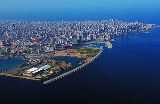
, with a population ranging from 1 million to more than 2 million (as of 2007). Located on a peninsula at the midpoint of Lebanon's Mediterranean coastline, it serves as the country's largest and main seaport, and also forms the Beirut Metropolitan area, which consists of the city and its suburbs. The first mention of this metropolis is found in the ancient Egypt
ian Tell el Amarna
letters, dating to the 15th century BC.
1759 An earthquake hits the Mediterranean destroying Beirut and Damascus and killing 30,000-40,000.
1941 World War II: Beirut is occupied by Free France and British troops.
1978 150 Palestinians in Beirut are killed in a terrorist attack during the second phase of the Lebanese Civil War.
1982 1982 Lebanon War begins: Forces under Israeli Defense Minister Ariel Sharon invade southern Lebanon in their "Operation Peace for the Galilee", eventually reaching as far north as the capital Beirut.
1982 Lebanese Civil War: a multinational force lands in Beirut to oversee the Palestine Liberation Organization's withdrawal from Lebanon.
1982 The international forces that were guaranteeing the safety of Palestinian refugees following Israel's 1982 Invasion of Lebanon leave Beirut. Five days later, several thousand refugees are massacred in the Sabra and Shatila refugee camps.
1983 A suicide bomber destroys the United States embassy in Beirut, Lebanon, killing 63 people.
1983 The Israeli cabinet votes to withdraw troops from Beirut but to remain in southern Lebanon.
1983 Lebanon Civil War: The U.S. Marines barracks in Beirut is hit by a truck bomb, killing 241 U.S. Marines. A French army barracks in Lebanon is also hit that same morning, killing 58 troops.
1984 US troops withdraw from Beirut. President Ronald Reagan had sent the troops as a peacekeeping force in August 1982.

